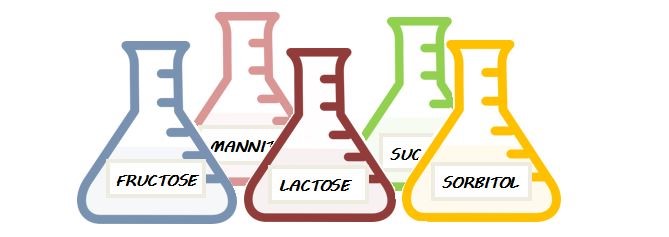Hydrogen and methane breath testing have been on the scene for quite some time now, and many of you with IBS will have heard of – or even had – these tests. Originally fructose and lactose were the main sugars tested, but many labs now also offer sorbitol and mannitol tests. And they can come with a fairly hefty price tag.
Breath testing sounds great in theory: a non-invasive, widely available test that is claimed can pinpoint the dietary triggers causing your food intolerance symptoms. You don’t even need a referral! For a decade or so these tests for FODMAP intolerances have been recommended by medical practitioners and in research papers, including some that I helped write years ago.
But are these tests as useful and accurate in diagnosing FODMAP intolerances as we used to believe? After so many years of treating patients with food intolerances and Irritable Bowel Syndrome, have we seen value in sending our adult clients off for FODMAP breath testing?
The short answer here would be no. And let’s look at some of the reasons why:
1. Breath testing can have both ‘false positive’ and ‘false negative’ results
Breath testing is based on the premise that when a sugar is not well absorbed in the gut, it will be fermented and result in the production of gas, which can then be measured in the subject’s expired breath. It therefore seems to be a reasonable way to try to measure an individual’s tolerance to potentially fermentable sugars (FODMAPs). Right?
However, scientific studies have shown that breath testing results can have poor reproducibility. In layperson’s terms, this means that a positive result will not necessarily occur again if the breath test is repeated in an individual who previously produced a positive result. A number of factors can affect the result on the day, including the gut transit time, the baseline diet followed, variations in gut flora and function, and the accuracy and training of the person taking the sample.
Let’s think about what would happen if your doctor did a blood test which showed high blood glucose, or high blood pressure. Rather than diagnosing you with diabetes or hypertension right then and there, and putting you straight onto medication, they would typically order further tests on different occasions, to see if the abnormal result was repeated.
Doing this is important, as one abnormal test result does not definitively diagnose a condition. For the same reason, we question whether a one-off breath test can definitively diagnose malabsorption of a test sugar (fructose, lactose, sorbitol, mannitol).
And what to do with the many people who receive a negative result and yet felt symptomatic on the day? Or those who scored a positive result (and may have even had a reading ‘off the chart’) and yet did not experience the gastrointestinal symptoms?
This is the conundrum of breath testing, and leads us to the next point…
2. The dose of sugar given
The dose of sugar given in breath testing is very large, and generally much more than would realistically be consumed in a real life setting of eating a meal.
For example, the amount of lactose given to adults by most labs is between 25-40g – the equivalent of two to three large glasses of milk consumed in a sitting!
In reality, all the lactose breath test is actually able to predict, is how the body handles a large dose of lactose, in a liquid form, on a fasting stomach. Around one in four of us would be given a ‘positive’ result, and labelled ‘lactose intolerant’, by this test. But many of these people would handle the moderate amount of lactose (6g) found in a tub of regular yoghurt without any gastrointestinal symptoms.
If we now look at the fructose breath test, average figures show that a huge one third of adults will score a ‘positive’ result when given the fairly standard 25g breath testing dose. Given that the free fructose in this dose is a massive fructose load and the equivalent of around 8-10 apples in one sitting, it’s no wonder that many people will malabsorb some and score a positive result!
Sadly, as dietitians, we see too many people at our practice who have been misled by breath test results into thinking that a small amount of honey, or eating the occasional bite of mango, or drinking tea or coffee with a splash of milk, would be tantamount to poisoning themselves. For most of these people, this is simply not the case.
3. Two of the main symptom-inducing FODMAP sugars are actually fermentable in EVERYONE, so are not measured by breath tests
Two common symptom-triggering FODMAPs, fructans (the FODMAP in onions and wheat products) and GOS (the problematic sugar in legumes, some vegetables and processed food ingredients) are difficult for ALL of us to digest (though we don’t all get symptoms). We don’t have, AND DON’T NEED, breath testing to tell us that these 2 sugars can be problematic for those with Irritable Bowel Syndrome.
So even when a full available suite of FODMAP breath tests (sorbitol, fructose, mannitol and lactose) are conducted for an individual, their complete FODMAP profile could not possibly be obtained because fructan and GOS intolerances are not captured.
The bottom line:
You eat food, not heavily loaded sugar drinks. One-off breath tests cannot always provide reliable, definitive diagnosis of FODMAP intolerances. And breath tests do not cover the full set of FODMAP intolerances anyway.
So where to then? Visit a dietitian! Dietitians are nutrition scientists, who study food science, biochemistry and physiology in our university degrees. Rather than sending clients off to spend substantial time and money on breath testing, experienced dietitians find more value in educating them about reducing FODMAPs in their diet as appropriate for their circumstances, and then reintroducing ‘normal’ amounts in foods in order to establish their individual tolerance and maintain nutritional adequacy.
And at Shepherd Works, we understand the science of FODMAPs, and how they can affect everyone differently. There is no “one-size fits all” approach – and we like to think that tailoring the low-FODMAP diet for each individual is a bit of an art form!
To make an appointment to discuss your symptoms with a specialist Shepherd Works dietitian, please contact us on +61 3 9890 4911, via email at info@shepherdworks.com.au, or via the booking enquiry form on this website. Consultations in person, over the phone or Skype are available.





